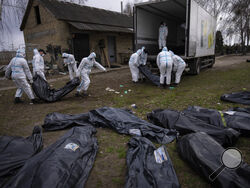THE HAGUE, Netherlands (AP) — The chief prosecutor of the International Criminal Court called Thursday for an international “overarching strategy” to coordinate efforts to bring perpetrators of war crimes in Ukraine to justice.
Since Russian President Vladimir Putin ordered the invasion of Ukraine on Feb. 24, his military forces have been accused of abuses ranging from killings in the Kyiv suburb of Bucha to deadly attacks on civilian facilities, including the March 16 bombing of a theater in Mariupol that an Associated Press investigation established likely killed close to 600 people.
“The simple truth is that, as we speak, children, women and men, the young and the old, are living in terror,” ICC Prosecutor Karim Khan said as he opened a Ukraine Accountability Conference in The Hague. “They’re suffering in Ukraine and in so many different parts of the world. Grieving about what they lost yesterday, holding their breath about what they could lose today, and what tomorrow can bring. At a time like this, the law cannot be a spectator.”
Khan said Thursday's ministerial meeting addressed “a need of coordination, of coherence" and "the need of an overarching strategy” as different nations and courts work to investigate and prosecute crimes.
The AP and FRONTLINE, which are tracking incidents in Ukraine, have so far tallied 338 potential war crimes.
U.S. State Department human rights envoy Uzra Zeya accused Russian forces of atrocities as she delivered a message to the conference from Secretary of State Antony Blinken. She said the accusations in Ukraine mirrored Russia’s previous actions in conflicts in Chechnya, Georgia, Syria and Ukraine since 2014.
“With each day, the war crimes mount. Rape, torture, extrajudicial executions, disappearances, forced deportations. Attacks on schools, hospitals, playgrounds, apartment buildings, grain silos, water and gas facilities," Zeya said. “These are not the acts of rogue units; they fit a clear pattern across every part of Ukraine touched by Russia’s forces."
Some 40 nations from the European Union and around the world sent representative to Thursday's conference hosted by Khan, Dutch Minister of Foreign Affairs Wopke Hoekstra and European Union Justice Commissioner Didier Reynders.
Reynders said the meeting was held as Ukraine investigates more than 20,000 war crimes in addition to the International Criminal Court probe and national investigations in 14 European Union member states. Among the topics is how investigators from different countries can collect and document evidence, including of sexual crimes, so it can be used in other jurisdictions.
In a video message to the meeting, Ukrainian Foreign Minister Dmytro Kuleba called on the international community to establish a tribunal to prosecute Russian leaders for the crime of aggression — when one state launches an unjustified attack on another.
The ICC does not have jurisdiction to prosecute the crime of aggression in Ukraine because neither Russia nor Ukraine is among the court’s 123 member states.
Kyiv has, however, accepted the court’s jurisdiction and that cleared the way for Khan to open an investigation in Ukraine in early March after dozens of the global court's member nations asked him to intervene. He has visited Ukraine to see firsthand the horrors inflicted on the country and sent the court's largest-ever team of investigators to gather evidence.
So far, the court has not announced any arrest warrants for suspects in the probe that could reach to the very top of Russia's military chain of command, as well as to the Kremlin.
The ICC is a court of last resort that opens cases when other countries are unwilling or unable to launch prosecutions. The Hague-based court has no police force to make arrests and relies on assistance from other countries to detain suspects.
The EU's judicial cooperation agency, Eurojust, helped establish a Joint Investigation Team made up of Ukraine and five other European nations. The team is meant to help facilitate evidence sharing.

